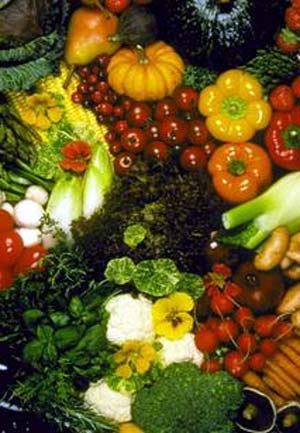|
|
A Japanese study has found that eating lots of vegetables and fruits during pregnancy may lower the chance of having a baby with certain allergies,. Dr. Yoshihiro Miyake at Fukuoka University Japan found that greater intake of green and yellow vegetables and fruits high in beta carotene (generally those colored red and orange) may lessen the risk of having a baby with eczema (itchy, dry, red patched skin). Foods high in vitamin E, found in some green vegetables, similarly may lessen the risk of having a wheezy infant, they report in the journal Allergy. Beta-carotene and vitamin E are two of many vegetable and fruit antioxidants thought to benefit health, though this area of research “is still developing,” Miyake notes.
In the current study, Miyake’s team evaluated vegetable and fruit intake during pregnancy of 763 women and their offspring’s early-age eczema or allergic wheeze. The women were 30 years old on average and about 17 weeks pregnant when they reported personal and medical history. When their babies were between 16 and 24 months old, the women provided birth and breastfeeding history, number of older siblings, and exposure to smoke. The team found that 21 percent of the youngsters wheezed or had a “whistling in the chest in the last 12 months,” and fewer than 19 percent had eczema. According to the investigators, moms who ate greater amounts of green and yellow vegetables, citrus fruits, or beta carotene while pregnant were less apt to have an infant with eczema. For example, after allowing for other eczema risk factors, eczema was more common among infants of moms who ate the least versus the most green and yellow vegetables – 54 and 32 infants, respectively. Likewise, higher intake of vitamin E during pregnancy was associated a reduced likelihood of having a wheezy infant — a finding that supports previous investigations from the U.S. and U.K. Boosting intake of green and yellow vegetables, citrus fruits, and antioxidants such as beta-carotene and vitamin E among moms-to-be “deserves further investigation as measures that would possibly be effective in the prevention of allergic disorders in the offspring,” the researchers conclude. Source: Reuters, 19 February 2010 |
|
